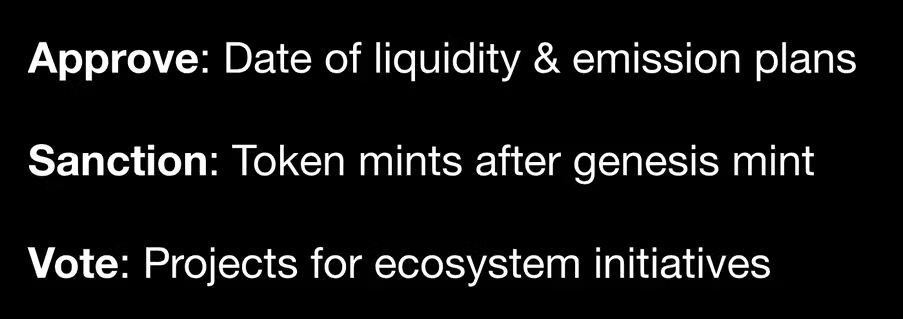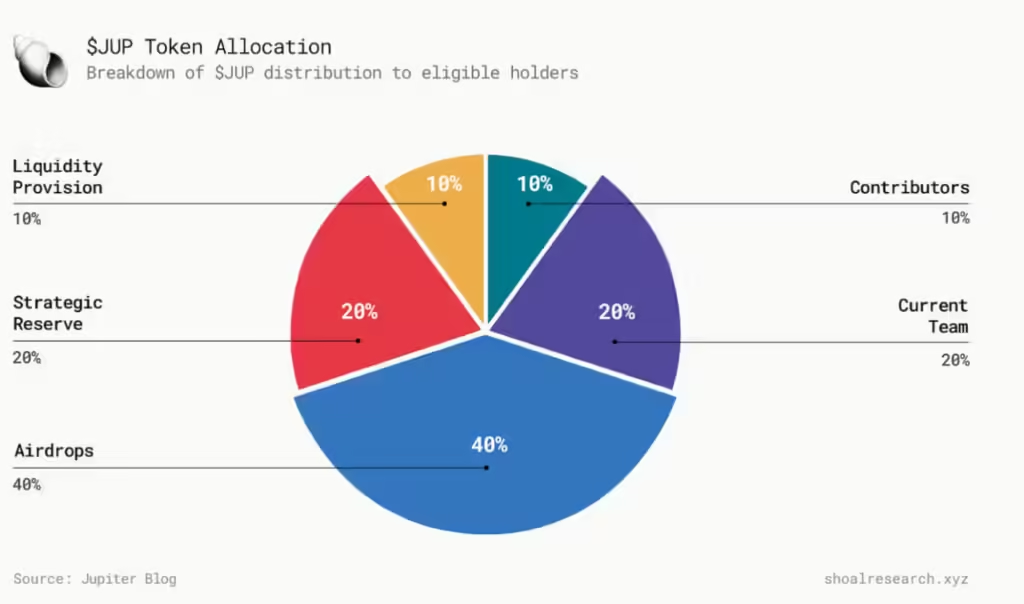Jupiter is one of the most popular platforms in the Decentralised Finance (DeFi) sector, on the Solana blockchain, and recently became the most popular DEX aggregator in the world. It has established itself as a significant liquidity aggregator, a role that involves pooling resources to ensure more efficient and effective token swaps, perpetual futures, and the management of decentralised stablecoins.
Originally, Jupiter’s focus was on aggregating liquidity for token swaps, positioning itself similarly to platforms which fulfil a similar role on Ethereum. However, it has recently expanded its offerings to include GMX-style perpetual futures. Furthermore, Jupiter is looking to launch its own decentralised stablecoin, which seeks to address the custodial and regulatory risks associated with more centralised stablecoins like USDC and USDT.
The cryptocurrency community is buzzing with anticipation for the upcoming JUP airdrop from the Jupiter project, set to occur on January 31, 2024. This event marks a significant milestone for both Jupiter and the Solana ecosystem, as it promises to reward the platform’s early adopters and active users.
In the first round of this eagerly awaited airdrop, one billion JUP tokens will be distributed, targeting a wide base of almost 955,000 wallets that have interacted with Jupiter before November 2, 2023. The inclusion of users who engaged through integrations like Sol-Incinerator and Solend further expands the reach of this initiative. This substantial airdrop not only aims to recognize and reward early supporters but also sets the stage for future rounds, which will focus on attracting new users and bolstering liquidity within Solana’s vibrant ecosystem.
Jupiter
Jupiter addresses a key challenge in the DeFi sector, specifically the need for efficient and effective liquidity aggregation for various financial instruments like token swaps, perpetual futures, and decentralised stablecoins. One of the most popular DeFi tools on the Solana blockchain, Jupiter serves to streamline and optimise trading activities within the DeFi space.
At its core, Jupiter functions as a liquidity aggregator. This means it pools resources from various sources to facilitate smoother and more efficient token swaps. By routing orders across multiple Solana-based exchanges, Jupiter ensures users get the best available price for their assets during a trade.
Initially, Jupiter began as a platform focusing on aggregating liquidity for token swaps, similar to comparable platforms on Ethereum. It has since expanded its offerings to include perpetual futures trading, broadening its scope and utility within the DeFi ecosystem.
The platform’s governance is facilitated by its native token, Jupiter, which allows community members to vote on key decisions and policies. This includes aspects like liquidity plans, token issuance, and ecosystem projects. The decentralised nature of governance aligns with the ethos of DeFi, empowering users and stakeholders in the platform’s development.
How Does Jupiter Work?
Jupiter, the world’s leading DEX aggregator, on the Solana blockchain, represents a significant advancement in the DeFi space. It stands out for its ability to provide users with access to the most competitive trading prices across a multitude of Solana-based DEXs and DeFi platforms, streamlining the trading process and enhancing efficiency.
What sets Jupiter apart is its innovative bridge comparator tool, which allows for efficient cross-chain trades by enabling users to select the most suitable bridge for transferring tokens from other blockchains to Solana. This feature is particularly valuable for users seeking to optimise their trading strategies and minimise transaction costs.
2023 was a landmark year for this token, characterised by a substantial surge in trading volume and user engagement, driven largely by the burgeoning meme coin and airdrop market on Solana. Jupiter’s user-friendly interface, reliable trading mechanism, and low fees have played a crucial role in its rise to prominence. The platform’s focus on the Solana ecosystem, combined with its strategic single-chain approach, has cemented its position as a dominant player in the DeFi sector. The anticipation surrounding Jupiter’s JUP token airdrop, scheduled for January 31, 2024, has further elevated its profile.
The Jupiter token, serving as a governance token, empowers holders to vote on critical aspects of the platform, including liquidity provision, future token emissions, and ecosystem initiatives. With an initial supply of 10 billion tokens and a significant portion allocated for community airdrops, this token is poised to play a pivotal role in the platform’s governance and future development.
How is Jupiter Unique?
It has seen explosive growth and popularity due to the upcoming airdrop of 1 billion Jup tokens as well as flipping Uniswap due to massive trading volume surrounding the WEN meme coin airdrop. Unlike standard DEXs, an aggregator like Jupiter scans multiple exchanges to find the best trade prices, providing users with optimal trading opportunities and liquidity from various sources.
One of Jupiter’s most versatile features is its bridge comparator tool, which facilitates efficient cross-chain transactions. This tool allows users to compare and select the most efficient bridge for transferring tokens between different blockchains and Solana, making Jupiter a critical player in the cross-chain interoperability domain.
Jupiter’s rise in popularity is evidenced by its significant trading volume and user base. It has become a go-to platform for users on the Solana blockchain, driven by its user-friendly interface and reliable trading mechanism.
Jupiter stands out in our solar system for a number of reasons:
- Size Champ: Jupiter is the undisputed heavyweight. It’s so massive, 1,321 Earths could comfortably fit inside its volume! This immense size shapes many other unique features.
- Speedy Spinner: Despite its bulk, it has the fastest rotation of any planet in our solar system. A day on Jupiter lasts only about 10 hours, which means its equator experiences very high wind speeds.
- Giant Storms: The Great Red Spot, a swirling anticyclonic storm bigger than Earth, is a prominent feature on Jupiter. This monster storm has been raging for centuries!
- Magnetic Marvel: It boasts the strongest magnetic field in the solar system, roughly 14 times stronger than Earth’s. This powerful field traps charged particles and creates amazing auroras.
- A Ring, But Not Like Saturn’s: While not as impressive as Saturn’s, it does have a faint ring system made up of dust particles.
- Moon Mammoth: It is the solar system’s moon king, with a whopping 95 known moons and potentially more waiting to be discovered! This vast moon system is like a miniature solar system orbiting the giant planet.
- Composition King: It is primarily composed of hydrogen and helium, just like most stars. This unique composition makes it unlike the rocky planets closer to the sun.
What is the Jupiter Ecosystem?
The Jupiter Ecosystem on Solana is a dynamic and integrated network comprising its DEX aggregator core, cross-chain functionality, the pivotal JUP token, an engaged community, and a strong link to the Solana blockchain’s features and user base. It represents a comprehensive approach to decentralised finance, emphasising user experience, community governance, and platform growth.
At the core of this ecosystem is its role as a DEX aggregator on the Solana blockchain. This aggregator function allows Jupiter to pool liquidity from multiple decentralised exchanges, offering users the best possible trading prices and deep liquidity pools across a wide range of tokens and trading pairs.
This token plays a central role in the Jupiter Ecosystem. As a governance token, it empowers community members to participate in critical decisions affecting the platform, including liquidity provisions, emission plans, and ecosystem initiatives. This decentralised governance model is a vital component of its ecosystem.
Its success and functionality are closely tied to the Solana blockchain. Solana’s features, such as low transaction fees and high throughput, have been instrumental in its growth, making it a preferred platform for traders and liquidity providers.
The term “Jupiter Ecosystem” can refer to two different things:
- Jupiter Networks Collaboration Ecosystem: This refers to the suite of products offered by Jupiter Systems, a company specializing in video wall processors and collaboration software https://login.jupitered.com/. Their ecosystem focuses on facilitating collaboration in critical environments like command and control centers by allowing users to connect various displays and video conferencing tools.
- Solana-based Jupiter Exchange Ecosystem: This refers to the network of applications and services built around this exchange, a decentralized cryptocurrency exchange (DEX) on the Solana blockchain https://jup.ag/. Here, the focus is on Decentralized Finance (DeFi) and includes various projects:
- Trading Platforms: Solanium, Jupiter Exchange itself
- Wallets: Phantom
- DeFi Projects: Genopets, DeFi Land, Bonfida, Sonar, MeanDAO, Mango
By using Jupiter Exchange’s DEX and other services within this ecosystem, users can benefit from features like:
- Swapping cryptocurrencies
- Earning interest on crypto holdings
- Participating in Initial DEX Offerings (IDOs)
- Accessing play-to-earn games
- Betting on sports events (through Divvy.bet)
In short:
- Networks Ecosystem – focuses on collaboration tools for video walls and conferencing.
- Solana-based Jupiter Exchange Ecosystem – focuses on DeFi applications and services built on the Solana blockchain.
What is the JUP Token?
The platform’s native token, JUP, is a governance token that empowers its community members to have a say in the platform’s direction and decisions. This includes approving liquidity and emission plans, sanctioning token mints post-genesis, and voting on ecosystem initiatives. Its approach to token distribution is notably community-centric, with a large portion of this token allocated for airdrops to active users.
The first significant airdrop targeted 955,000 wallets that interacted with this before a specific cutoff date, making it one of the largest airdrops to date. It is set to distribute 1 Billion JUP tokens on January 31st, 2024, when an airdrop is slated to take place. This strategy not only rewards early and active users but also aims to decentralise ownership and governance of the Jupiter platform, enhancing its attractiveness and stability as a platform for DApps and services.
- It functions primarily as a governance token. This means that holders of this tokens have a say in the decision-making processes that guide the development and operation of this platform. This includes voting on proposals related to the platform’s functionality, updates, and other critical aspects.
- The initial supply of this tokens is set at 10 billion. The distribution of these tokens is designed to support the ecosystem and engage the community. 40% of the initial supply is allocated for community airdrops, while another 40% is reserved for the team and strategic development. The remaining 20% was initially earmarked for token sales but later reallocated to liquidity provision, community contributors, and grants.
- Beyond governance, this token may have additional utilities, which could include participating in liquidity pools, staking, or accessing certain features within the Jupiter ecosystem. These utilities often aim to incentivize holding and using the token within the platform, thus driving engagement and contributing to the platform’s liquidity.
- Its airdrop is a significant event in the token’s distribution strategy. It aims to decentralize token ownership, reward early adopters and active users, and attract new users to the platform. The airdrop is structured in multiple tiers, ensuring a broad and equitable distribution of tokens among participants with different levels of engagement.
- The full utility and impact of this token will likely evolve as this platform grows and introduces new features and functionalities.
Tokenomics of JUP
Designed as a governance token, it will allow holders to influence crucial aspects of the ecosystem. This includes voting on the critical aspects of the token itself, such as the timing of initial liquidity provision, future emissions beyond the initial mint, and key ecosystem initiatives.

The key objectives of the token are:
- Energising the Solana ecosystem by attracting new capital flows and users.
- Generating momentum for the launch of new ecosystem tokens: It is poised to act as a catalyst for introducing more ecosystem tokens.
- Build a Strong and Distributed JUP Community.
Furthermore, the utility of it will evolve depending on the direction taken by the community. Potential future utility for the token could include:
- Fee reduction on the perpetual exchange.
- Improved access and allocation to the launchpad.
- Fee sharing on the Automated Market Maker (AMM).
With a maximum supply of 10 billion JUP, the token distribution is equally split between 2 cold wallets: the team and community wallets. The team wallet will be used for allocations for the current team, treasury, and liquidity provision, while the community wallet is geared towards airdrops and various early contributors.

The One-Stop Shop for DeFi on Solana
It is one of the biggest DeFi projects on Solana to date. Though it was initially conceived as a swap engine, the protocol has evolved significantly to include a number of different products for different kinds of users, such as Dollar-Cost Averaging (DCA), limit orders, perpetual trading, and, most recently, a launchpad. Its product is top of the game and well-appreciated by its community.

As such, it is in a unique position, and its ecosystem revolves around three primary components:
1. Solana’s long-term adoption: 2023 was a year of rebirth for Solana as network activity picked up. A continuation of this trend can be positive for its future.
2. DeFi going mainstream: Its ethos centres on the belief that the future of trading is on-chain. Its unique product contributes to the evolution of DeFi toward mass adoption.
3. The power of communities: Community-led initiatives are at the centre of its ecosystem, and this project is committed to listening to their communities’ feedback to keep delivering the best products.
Moreover, this project remains dedicated to continuous innovation, aiming to improve existing features and introduce new products aligned with its three main business model anchors:
- Delivering the best UX possible
- Maximising the potential of Solana’s technical capabilities
- Improving Solana’s liquidity landscape as a whole
How to Store JUP?
JUP is an SPL-based token. You can manage it balances with a browser, desktop, mobile, or hardware wallet that supports the Solana blockchain.
How to Buy and Sell Jupiter?
You can buy and sell it with Turkish Lira and Tether on the BtcTurk | Kripto website or the BtcTurk | Kripto mobile application. If you are not a member of BtcTurk | Kripto, you can sign up immediately on our website or mobile application and buy Jupiter. You can deposit Turkish Lira 24/7, using 7 affiliated banks.
We remind our users to conduct necessary research and examination within the scope of their risk management principles and to trade according to their own risk-return levels.
Conclusion
Jupiter is part of the new wave of DeFi projects that aims to make trading on-chain seamless. Its different product offerings facilitate cheap, quick and secure trading and DeFi operations. As such, this project represents a significant evolution for DeFi on Solana.
SwissBorg’s commitment to a secure, user-friendly, community-centric and versatile platform aligns perfectly with Jupiter’s innovative approach, providing both communities with an exciting and dynamic opportunity. Through this integration, this token holders can now enjoy the ease of buying, selling, and exchanging cryptocurrencies with 16 different fiat currencies , such as EUR, CHF, and GBP. Further, this integration greatly enhances the accessibility and usability of JUP, promoting wider participation and simplifying the investment process.
The collaboration between SwissBorg and Jupiter exemplifies the spirit of innovation and progress that continues to drive the DeFi and cryptocurrency space forward. Both projects are poised to reshape the landscape and provide users with more comprehensive, secure, and user-friendly solutions, marking a significant milestone in the evolution of decentralised finance. We are excited to witness the positive impact of this partnership and look forward to further advancements within the crypto and DeFi ecosystems.
Disclaimer ||
The Information provided on this website article does not constitute investment advice ,financial advice,trading advice,or any other sort of advice and you should not treat any of the website’s content as such.
Always do your own research! DYOR NFA
Coin Data Cap does not recommend that any cryptocurrency should be bought, sold or held by you, Do Conduct your own due diligence and consult your financial adviser before making any investment decisions!



